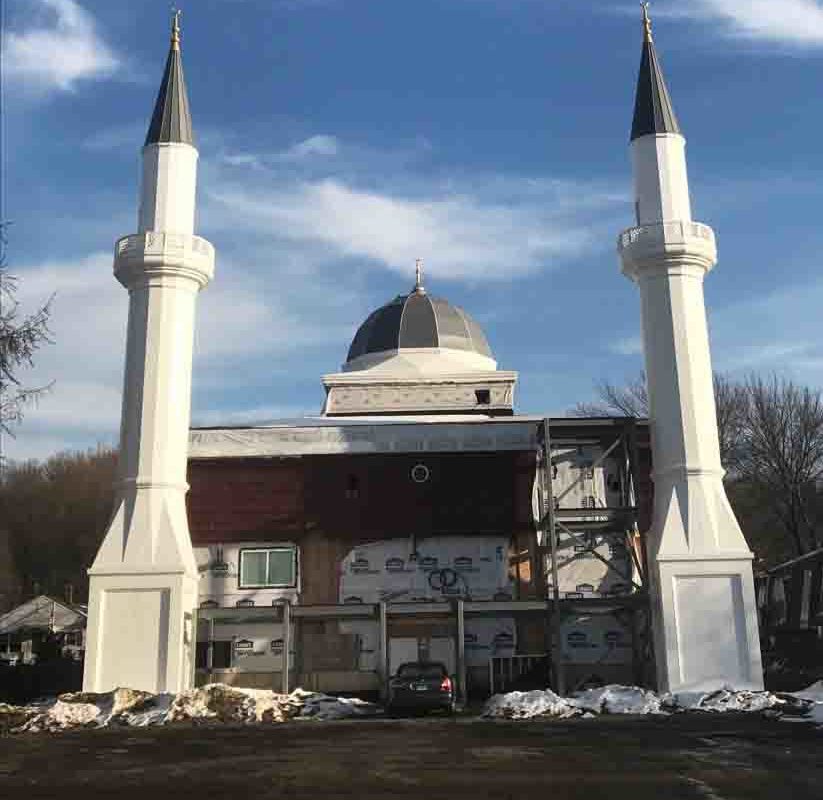
Ahmed Elbenni
The construction of twin minarets by a local mosque has been halted for the second time due to city regulations determining how high a structure can be built.
In 2013, leaders of the mosque, which is located at 351 Middletown Ave. and 126 Weybosset St., began plans to construct two 57-foot minarets, which serve as towers from which Muslims are called to prayer. In early December 2015, the City Plan Commission approved the mosque’s proposal for the towers, but nine months later, the city ordered the mosque to stop work until they submitted additional documentation.
The mosque was able to resume construction, but in November they once again had to stop. A survey conducted by the city in November found that the minarets ended up being 81-feet tall, and thus in violation of the building permit, which only allowed the minarets to be 57-feet high.
“The maximum permissible height for any construction project is what the submitted plan calls for and what is approved by the city,” said Laurence Grotheer, New Haven city spokesperson. “Certainly there are buildings throughout New Haven that are taller than 57 feet. This particular project, though was planned and approved for that 57-foot maximum height. And now the actual height exceeds what was planned, submitted, and approved.”
James Turcio, the chief building official of the New Haven Building Department, said in an email that the controversy surrounding the minaret has since been “resolved,” though he declined to share further details.
The minarets were pre-constructed in Turkey, before being shipped to the United States for assembly. A mistake by the minarets’ architects in Turkey led to the height violation, according to a Feb. 10 report in the New Haven Independent.
The mosque was purchased in 2010 by the Turkish-American Religious Foundation, an organization affiliated with the Turkish government that helps construct mosques around the country. The group purchased the New Haven location, seeking to renovate it and accommodate the religious needs of New Haven’s growing Turkish-American population.
According to Grotheer, the city is working with the owner of the mosque to arrive at a “suitable resolution.” But the efforts have been complicated because of the requirement that an independent engineer review buildings that exceed 60 feet. This engineer’s evaluation is meant to ensure that the building’s foundation can support structures in excess of 60 feet.
“Now [that] the foundation is already completed, it’s hard to imagine an independent engineering company getting access to the foundation to certify its ability to hold up something so tall without dismantling the foundation,” Grotheer said.
As such, the minarets will likely need to be shortened by roughly 24 feet, so that they can abide by the building permit’s maximum height requirement, according to the Independent. Despite the halt in the minarets’ construction, the mosque has served as a religious space for New Haven’s growing Turkish-American population. Taha Ramazanoglu ’17, a Turkish student, first discovered it through a family friend who lives in the city, and has attended the congregational prayers there several times.
Although Ramazanoglu prefers to pray at locations closer to campus, he still goes to the mosque a few times a year. To him, the addition of the minarets, which are prominent cultural and religious icons in the Islamic world, symbolizes New Haven’s embrace of diversity.
“[The minarets] are proof that New Haven welcomes communities, cultures, religions and people of all backgrounds” said Ramazanoglu. “Such differences always add to, not detract from, the richness of the tradition and history of a city and its habitants, so I think the minarets stand against the xenophobia and Islamophobia that is becoming more pervasive and vociferous within administrations in the U.S. and around the world.”
The mosque also serves as home to Muhammet Efe, an imam sent from Turkey, who resides on its second floor with his family. The mosque’s congregation consists of roughly 150 individuals, and is headed by Haydar Elevelu, who owns a Turkish restaurant in Wallingford, Connecticut, called Rick’s on 5.
Correction, Feb. 27: An earlier version of this story mistakenly attributed information about how much the minarets would need to be shortened by to city spokesman Lawrence Grotheer when in fact the information was from the New Haven Independent.







